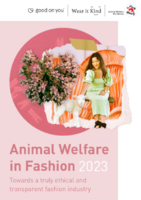
Fashion’s biggest animal welfare friends and foes revealed in our new report!
Which British brands are doing better for animal welfare and climate standards and who is falling short?
Highlighting animal welfare as an essential component of truly sustainable fashion, we rated 100 brands, spanning 15 countries, using Good On You’s methodology for ‘animals’.
The headline?
Well, whilst progress has been made for animal welfare in fashion, efforts by brands have not gone far enough and some have even taken backwards steps, despite business and consumer attitudes positively changing.
Only 15% of brands involved were rated ‘Good’ or ‘Great’ (75+) for ‘animals’
Of the 100, 20 fashion labels from the UK were included in the research
¾ of brands included now have animal welfare policies in place - 10% more than last reviewed in 2021
Only 4% of brands were revealed to have invested in the development of next-generation (‘next gen’) alternatives to potentially cruel materials
The bad
Luxury icon Harrods brought up the rear as the worst performing brand included in the report with a score of just 34 (not good enough). This is namely because of their lack of any animal welfare policy for textiles, as well as their overall endorsement of fur items.
We also saw poor scores from the British supermarket fashion brands like Tu Clothing, George and F&F. Despite their ‘parent’ brands having made some strides for animal welfare in their food policies, it is disheartening that their poor and, in some cases, non-existent textile policies aren’t matching up.
The good
Stella McCartney continues to lead the way by prioritising their commitments to animal welfare in their fashion lines.
In the more ‘affordable’ fashion world, Missguided made strides, achieving a ‘Good’ ranking, despite not having a dedicated animal welfare policy. This high score was awarded based on their overall move to no longer sell any animal derived materials.
The up and coming
The company showing the most improvement since our last report was Primark. The brand has committed to certification schemes on all animal derived materials where possible, and most notably have committed to full transparency in manufacture (a rare move in the sector), along with their support for our campaign against mulesing by signing our Brand Letter of Intent, we are pleased to see them take these big steps to reduce their impact on animal welfare, and hope this will catch on for other brands.
Whilst we celebrate the improvements made by British high street favourites like Primark and the high performing brands like Stella McCartney showing their peers how truly sustainable fashion is done, it is important we focus on the future and pushing further with sustainable ‘next gen’ materials to ensure a future free from animals in fashion.
We hope that this report will encourage brands to continue their journeys to address animal welfare in their supply chains, commit to better standards, and be more transparent about the materials used in their manufacturing!


